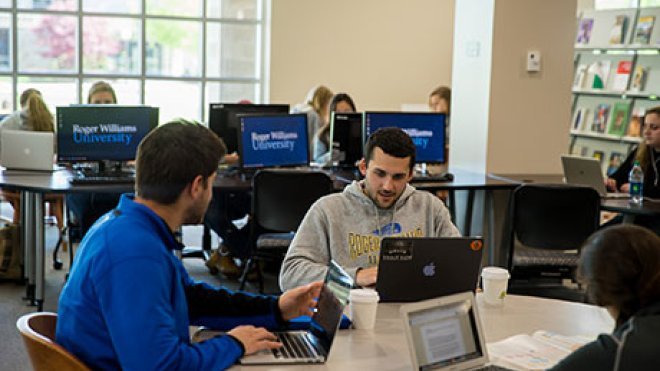RWU Leads The Way in Saving Students Money on Textbooks
Open educational resources resulted in $57,800 in savings for Roger Williams University students in the last academic year

BRISTOL, R.I. – Roger Williams University has saved its students an estimated $57,800 in the last academic year alone by replacing expensive printed textbooks with open educational resources (OER), which are free and openly licensed materials such as digital textbooks, multimedia files and online lesson plans.
“The days of traditional textbook publishing are behind us,” said Assistant Professor Lindsey Gumb, RWU’s Scholarly Communications Librarian. “This is the future.”
The average student at a private four-year college spends $1,220 per year on textbooks and supplies, according to the College Board. “That’s a lot of out-of-pocket money that often doesn’t qualify under student loans,” Gumb said.
And 65 percent of students say they’ve decided against buying a textbook because it was too expensive, according to a 2014 study by the Student Public Interest Research Groups.
“That can become a barrier to learning,” Gumb said. “It’s frustrating for both faculty and students when you assign reading for homework. With open textbooks, students have free access to the content on the first day of class. Everyone wins.”
To address the mounting problem, RWU began providing $500 to Open Educational Resources Faculty Fellows who agree to work with Gumb to identify free and open resources that replace traditionally copyrighted textbooks in their classes. Seven or eight faculty members participate each year, and this marks the program’s third year, she said.
“Our OER Faculty Fellows Program furthers the commitment of Roger Williams University to affordable excellence,” RWU Vice Provost Robert E. Shea said. “We recognize that expanding college access and affordability requires more than just attention to tuition costs, but must institutionalize efforts to rein in total costs of attendance. This program incentivizes faculty to create, select and utilize quality open source resources.”
During the 2017-18 academic year, RWU saved 578 students an average of $100 each on textbooks through open educational resources, Gumb said. “This is a huge step toward making college more affordable,” she said. “The idea behind open educational resources is to make education accessible to all students – regardless of socioeconomic status.”
Affordability is not the only benefit, Gumb said. “It also gives professors more academic freedom in the classroom because when copyright restrictions disappear they have the ability to revise, reuse and redistribute material that truly aligns with their course learning outcomes,” she said. “You can’t do that with copyrighted material.”
RWU Professor of Sociology Teal Rothschild said, “Working with Lindsey Gumb has helped me reinvigorate how I deliver the content for my Introduction to Sociology class. Her expertise with media and library resources has allowed me the opportunity to really re-think my pedagogical approach, without compromising any sociological content.”
Textbooks can be helpful at the introductory level in sociology, Rothschild said. “But there are some consistent shortcomings in textbook offerings that are hard to work with. OER allows the instructor to omit certain unnecessary chapters, provide links to more contemporary research, and customize the text so that it really fits not just the class but where the actual class of students are in their learning process.”
The open educational resources program is a collaborative effort between the University Library and the Center for Scholarship, Assessment, Learning, Teaching, and Technology (CSALT2).
Gumb said every college and university in Rhode Island is using open educational resources to some extent. “But RWU definitely stands out as a leader in the state for this initiative,” she said.
In September 2016, Gov. Gina M. Raimondo announced a statewide Open Textbook Initiative, challenging Rhode Island’s colleges and universities to save students $5 million over five years by using openly licensed textbooks. Gumb is co-chair of the Open Textbook Steering Committee, along with a Rhode Island College representative, Dragan Gill.
On July 11, RWU hosted a retreat for the Open Textbook Steering Committee at its Bristol campus. “It’s a community of practice that talks about what’s working, what’s not working,” Gumb said of the steering committee. “We’re guiding each other and thinking of how we are assessing the impact.”
Last year, RWU hosted a keynote address by Rajiv Jhangiani, Special Adviser to the Provost on Open Education and a Psychology Instructor at Kwantlen Polytechnic University, in British Columbia, Canada, where he conducts research on open education and the scholarship of teaching and learning.
Also, Gumb spoke with the RWU Student Senate last year. “They were so excited and supportive,” she said. “I plan on engaging with them a lot more in the fall.”